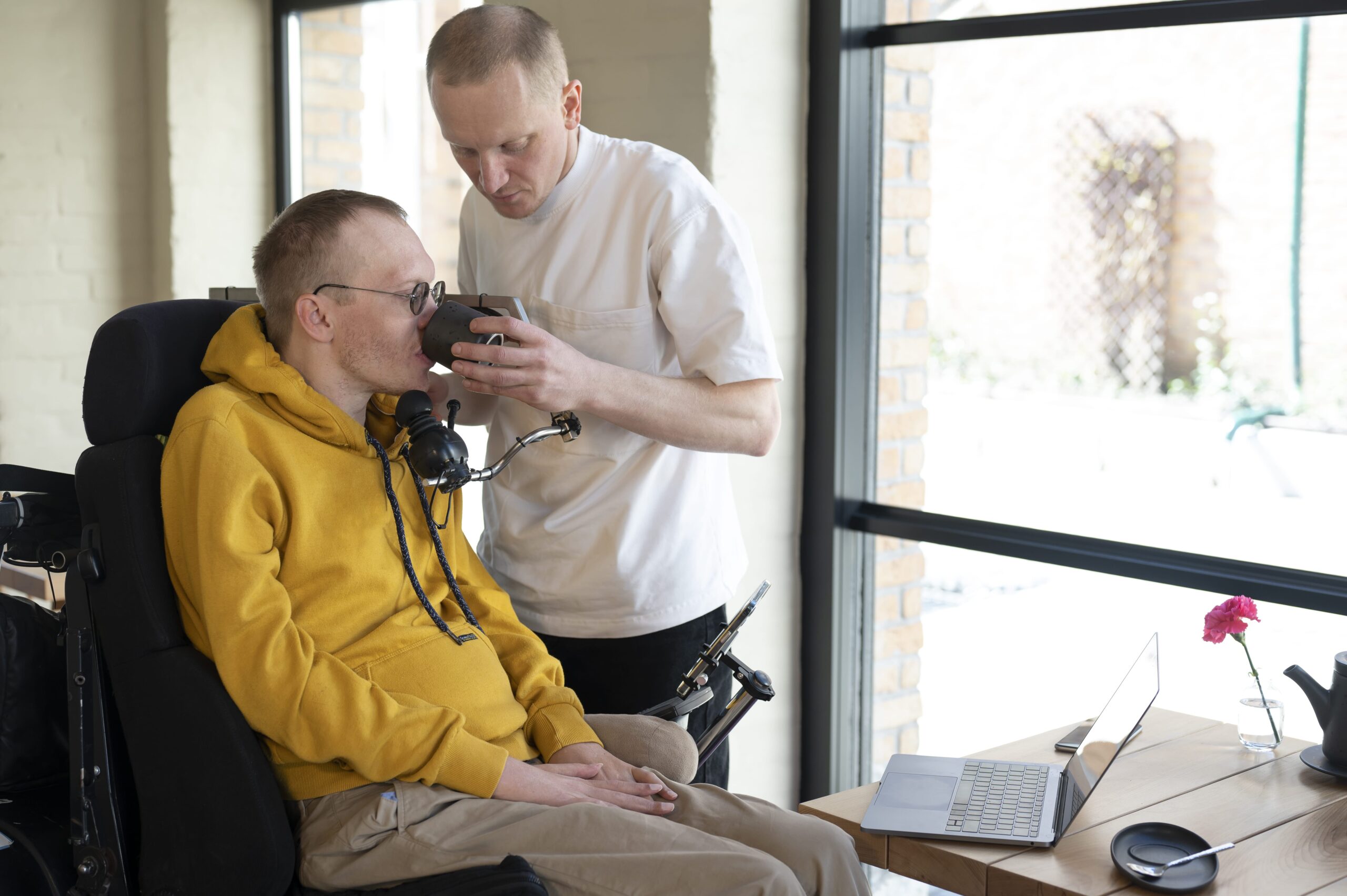Caring for a parent living with dementia is tough, especially when they refuse home care. Dementia patients often resist change, fearing the loss of independence, unfamiliar environments and caregivers that home care can bring.
Imagine feeling lost in your own home or scared of strangers coming in. It’s natural for the elderly to resist change and cling to what’s familiar. But deep down, you know they need support, even if they won’t admit it.
It becomes difficult to handle such a situation as you cannot force them, and they do not understand why you insist on them going for home care. While it’s challenging, there are ways to help your parent feel more comfortable with the idea of getting care at home.
In this blog, you’ll get insights into the reasons why they refuse and strategies to ease their transition while ensuring their well-being.
What is Dementia?
Dementia is a broad term describing a decline in cognitive function that disrupts daily life. It’s not a normal part of aging and can affect memory, thinking, reasoning, communication and even personality. Common symptoms include memory loss, difficulty in problem-solving, impaired communication, aggressive nature and changes in mood or behaviour.
Dementia is most commonly caused by Alzheimer’s disease. However, there are other types, such as vascular dementia, Lewy body dementia and frontotemporal dementia.
At what age does dementia start?
The most significant known risk factor for dementia is age, with the majority of cases occurring in individuals aged 65 and older. As dementia advances, individuals may require increasing levels of assistance with activities of daily living, leading to challenges in caregiving and decision-making.
Now, let’s understand the “Why” Behind the Refusal
Reasons for Dementia Patients to Refuse Nursing Home Care
Loss of Autonomy
Dementia patients often experience a loss of autonomy as their condition worsens. They may feel a sense of frustration and loss of control over their lives. Further, accepting help with everyday tasks like dressing or bathing can feel like giving up control. This fear of losing autonomy can make them resistant to home care, even if they need assistance.
Fear and Anxiety
The unfamiliarity of caregiving routines or medical procedures can trigger fear, anxiety, and aggression in dementia patients. They may perceive these interventions as threats to their safety or as attempts to take away their independence. The patient can respond to aggression in dementia, which can lead them to violent changes or cling to what feels safe.
Communication Barriers
Difficulty expressing needs and understanding instructions can create communication barriers for dementia patients. Misinterpretation of cues or an inability to articulate discomfort may result in refusal of care, as the carer may not fully grasp the patient’s concerns or preferences.
Physical Discomfort
Sometimes, physical discomfort can be a hidden reason for refusing nursing home care. Dementia patients might struggle to articulate pain verbally, especially if it’s a recent issue. They may resist care due to fear of exacerbating the pain associated with certain movements or procedures. This is where it’s crucial to avoid mistakes in dementia care. By understanding this Physical discomfort and focusing on maintaining a sense of control for as long as possible, caregivers can encourage a smoother transition to home care.
Preservation of Familiar Surroundings
For many with dementia, their home environment becomes a safe haven. Familiar surroundings provide a sense of security and control. The idea of leaving their home or having outside help disrupts this sense of comfort. They may resist home care simply because they don’t want anything to change. activities to do with dementia patients
Make the wise choice for dementia care. Contact us now to give your loved one the exceptional care they deserve.
What to do When a Dementia Patient Refuses to Go in Care?
Dealing with a dementia patient who is refusing to go into care can be a challenging situation. However, it is important to approach the situation with sensitivity and respect for their autonomy. Here are steps you can take to address it:
Listen to their Concerns
Dementia patients, like anyone else, want to feel heard and understood. Understand why they are refusing care. It could be due to fear, confusion, or a desire to stay in familiar surroundings. Give them your full attention, validate their emotions, and inquire about their concerns through open-ended questions. For example, “What worries you most about going to an aged care facility?”
Provide Reassurance
Offer reassurance that patients will be surrounded by trained professional care providers who understand their condition in the aged care home. Address any specific fears or misconceptions they may have about the care home. By painting a positive picture of the care facility and highlighting the opportunities for engagement, social interaction, and comfort, you can help alleviate the patient’s concerns and create a sense of optimism about the transition.
Involve Them in Decision Making
Offer choices within limits and provide information in a way that is easy for patients, especially those experiencing dementia care refusal, to understand and make decisions. For instance, you can say, “We’ve found a few different residential care facilities that provide excellent care”. “Which one do you think might be the best fit for you?” Even if their capacity to make decisions is limited, involving them in the process can still empower them and foster a sense of control over their situation.
Use Positive Reinforcement
Positive reinforcement can motivate the patient to be more open to accepting care. Acknowledge and praise even small steps towards accepting care. For example, participating in a discussion about care options or taking a tour of a residential aged care facility could be a good example. Offer small rewards or incentives that align with the patient’s preferences and interests, reinforcing the positive aspects of receiving care.
Consider In-home Care
If the patient is resistant to relocating to a care facility, consider exploring the option of in-home dementia care instead. In-home care can effectively address social isolation, a prevalent issue among dementia patients, and provide a place for enjoyable activities for people with dementia to help them rekindle their sense of security and autonomy. This alternative enables the patient to retain their independence and autonomy while receiving essential support with daily tasks, medication management, and companionship. Additionally, receiving care in the familiar environment of their own home can provide a sense of comfort and security for the patient.
Address Underlying Issues
Sometimes, refusal of aged care can be a sign of unmet needs or underlying issues such as pain, discomfort, or loneliness. If a patient is in pain, has difficulty with daily tasks, or feels lonely, address those issues first. By addressing their pain through medication, physical therapy, or other, you can improve their overall comfort and quality of life, making them more receptive to receiving aged care assistance.
Respect their Autonomy
While ensuring the patient’s safety and well-being, it’s important to respect their autonomy and choices as much as possible. Acknowledge their preferences and incorporate them into the care plan to the extent feasible. By respecting the autonomy of the dementia patient, caregivers can help them feel more empowered and involved in their own care, which can enhance their sense of dignity and reduce resistance to care.
Create a Transition Plan
Work with the care facility to develop a personalized transition plan that addresses the patient’s specific needs and concerns. Schedule visits to the care facility prior to the move to allow the patient to become acquainted with the environment. During these visits, introduce the patient to key staff members, show them around the facility and explain the various amenities and services available. Encourage the patient to bring personal belongings like photos, favorite blankets, or small furniture items to decorate their new space. This can create a sense of ownership and comfort.
Seek Professional Help
Consult with healthcare professionals, such as doctors, social workers, or geriatric care managers, for guidance and support on what to do with dementia patients can help a lot. They can provide valuable insights, suggest effective approaches, and offer resources or referrals to specialized care services that can assist in persuading the patient to accept an aged care home. Their technology aids for dementia patients can help you navigate the situation more effectively and ensure the best possible outcome for the patient.
Conclusion
Moving your loved one into a nursing home is undoubtedly one of the most difficult decisions you can face. However, actively listening to their concerns, offering reassurance, and involving them in decision-making to the extent possible will help alleviate their fears and empower them in their care journey.
If you are looking for professional dementia care services for your loved ones, consider Wise Choice Dementia Care. Our dedicated team of caregivers is trained to provide empathetic and specialised care for individuals with dementia. Whether you need in-home care or assistance with transitioning to a nursing home, we’re here to support you and your family every step of the way. Give your loved one the invaluable gift of compassionate care. Contact us today.


